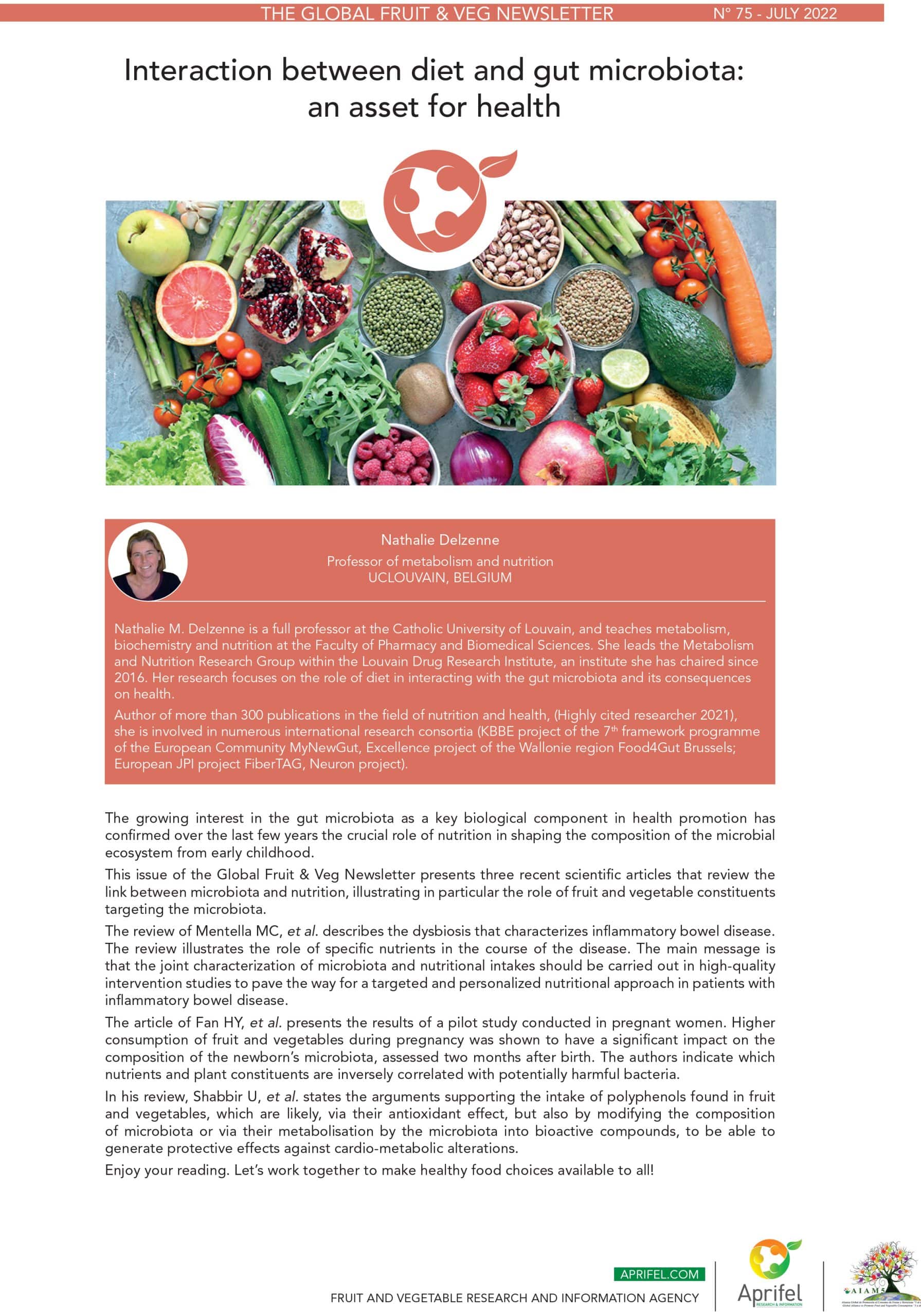Maternal fruit and vegetable intake during pregnancy influences infant gut microbiome

Maternal nutrition during pregnancy may affect the mother-to-child transmission of bacteria, resulting in gut microflora changes in the child with long-term health consequences later in life. However, evidence supporting the effect of maternal nutrition during pregnancy on the infant gut microbiome remains scarce, and most relevant studies have been conducted on animal models (Chu, 2016).
The following pilot study explored the impact of high/low gestational intakes of fruit and vegetables on the infant microbiome and investigated the interrelationships between maternal nutrient intakes and the abundance of infant gut microbiome taxa.
Maternal fruit and vegetable consumption and their nutrient status
Mothers with high fruit and vegetable consumption had a significantly higher intake of some macronutrients (glucose, fructose, and dietary fibers), vitamins (folic acid and ascorbic acid), and minerals (potassium) compared with mothers with low fruit and vegetable consumption.
Maternal fruit and vegetable consumption was significantly correlated with infant gut microbiome composition
The microbiome of 2-month-old infants varied depending on whether the maternal consumption of fruit and vegetables during pregnancy was high or low (Table 1). Though, other potential confounders such as maternal age and education level, family income, gestational age and weight gain, delivery mode, antepartum antibiotics, group B Streptococcus positivity, sex of the infant and breastfeeding did not impact the infant gut microbiome.
| Gut microbiome of 2-month-old infants with high maternal fruit and vegetable consumption |
Gut microbiome of 2-month-old infants with low maternal fruit and vegetable consumption |
| Higher abundance of Propionibacteriales, Propionibacteriaceae, Cutibacterium, Tannerellaceae, Parabacteroides and Lactococcus | Higher abundance of Prevotella_2, Prevotella_9, Isobaculum, Clostridia, Clostridiales, Lachnospiraceae, Hungatella, Lachnoclostridium, Ruminococcaceae, Flavonifractor, Erysipelatoclostridium, Acidaminococcaceae, Phascolarctobacterium, Megamonas, Betaproteobacteriales, Burkholderiaceae, and Sutterella |
Beneficial health effects of Cutibacterium, Parabacteroides, and Lactococcus found in higher abundance in gut microbiome of infants with high maternal fruit and vegetable consumption are demonstrated in the literature, mainly on infant immunity.
- A specie of Parabacteroides, P. distasonis, can improve human bowel health and is negatively associated with celiac disease. An experiment on mice showed that it can also reduce weight gain, hyperglycemia, and liver steatosis whereas another experiment found a significant reduction of the severity of intestinal inflammation of acute and chronic colitis (Sánchez, 2010; Wang, 2019).
- Lactococcus lactis, a specie of Lactococcus, activates innate immunity and protects from infection (Beck, 2015; Kim, 2013). Some Lactobacilli can moreover produce short-chain fatty acids with can modulate gut immune response and thus shape the pulmonary immune environment and influence the severity of allergy inflammation (Du, 2020; Furusawa, 2013; Arpaia, 2013).
Higher maternal intake of fructose, dietary fiber, folic acid, and ascorbic acid are negatively associated with the abundance of unhealthy infant gut microbiome
According to this study, maternal dietary intake high or low in specific macro- and micro-nutrients are associated with the abundance of infant gut microbiome (Table 2).
Results show that higher maternal intake of fructose, dietary fiber, folic acid, and ascorbic acid are negatively associated with unhealthy infant gut microbiomes such as Erysipelatoclostridium, Betaproteobacteria and Lachnospiraceae.
| Maternal dietary intake | Infant gut microbiome |
| Macronutrients | |
| Fructose | Low abundance of Erysipelatoclostridium |
| Glucose | An increased abundance of Isobaculum |
| Dietary fiber | A lower count of Lachnospiraceae |
| Micronutrients | |
| Folic acid | A lower abundance of Betaproteobacteria |
| Ascorbic acid | A higher abundance of Staphylococcus |
| Magnesium | Lower abundance of Clostridia, Clostridiales and Lachnospiraceae |
| Potassium | |
Based on: Fan HY, et al. Maternal Vegetable and Fruit Consumption during Pregnancy and Its Effects on Infant Gut Microbiome. Nutrients. 2021 May 5;13(5):1559.
- A diet high in fruit and vegetables during pregnancy may alter the infant gut microbiome.
- A higher intake of nutrients present in fruit and vegetables (fructose, dietary fiber, folic acid, and ascorbic acid) is negatively associated with the abundance of unhealthy gut microbiomes (Erysipelatoclostridium, Betaproteobacteria and Lachnospiraceae).
- Strategies involving increased maternal intake of fruit and vegetable during pregnancy should be employed for modifying the gut microbiome early in life.

